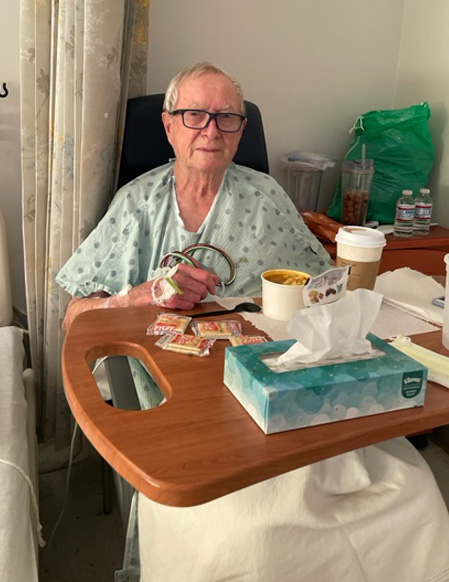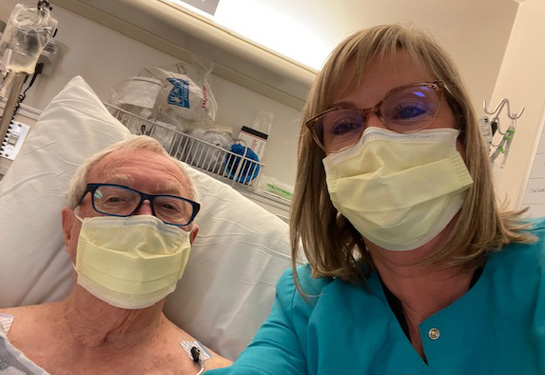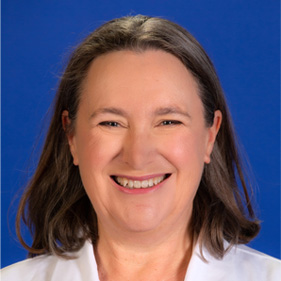Emergency Department earns accreditation for its care of older adults
This past January, 91-year-old Art Foster began fighting a “cold that seemed like it wouldn’t end.” After a telehealth visit, his doctor recommended he quickly get to the emergency department (ED).
“It turns out he had an infection throughout his entire body,” recalled his daughter, Alison Gomez, who drove him to UC Davis Medical Center from his home that day.
Foster’s condition turned life threatening. After asking Gomez and her sister about their father’s wishes, the care team jumped into action.
“I was lucky to survive,” Foster said.
Complex conditions require coordinated approach
UC Davis Medical Center has achieved national recognition for its ability to provide quality care for patients like Foster. On April 4, the American College of Emergency Physicians (ACEP) awarded Geriatric Emergency Department Accreditation — Gold Level 1, the highest level of accreditation — to the geriatric ED. UC Davis Health is the only ED in Sacramento to earn this accreditation and joins only 21 other EDs in the nation that have achieved gold status.
“While our older patients may show up because of injuries sustained by a fall or complications from congestive heart failure, our treatment goes beyond that acute situation,” explained Katren Tyler, the physician who oversees the Age Friendly Emergency Department and a leader of UC Davis Health’s healthy aging work. “We must evaluate conditions that are more common as we get older, addressing underlying conditions and ensuring safe transitions, be it inpatient or outpatient in a community setting.”

More than 19,000 people over the age of 65 visit UC Davis Health’s ED each year. And while their younger counterparts often use the ED for one-time crises, older adults often arrive with complex underlying conditions.
Authors of a major study that details the increase in geriatric emergency rooms argue that conventional EDs may not adequately address older patients’ unique needs. Since EDs lie at the crossroads of inpatient and outpatient care, they can be game changers in the health and well-being of older adults when designed specifically with them in mind.
That’s why Tyler led the ACEP effort, which provides a standardized set of guidelines to improve the care of older adults.
To earn accreditation, the multidisciplinary team of emergency physicians, geriatric nurse specialists, pharmacists and others must follow specific protocols that:
- Ensure focused education and interdisciplinary staffing for the care of older adults
- Provide standardized approaches to care that address common issues for older people
- Ensure optimal transitions of care from the ED to other settings (inpatient, home, community-based care, rehabilitation, long-term care)
- Promote quality improvement workflows for the care of older adults and enhancements of the physical environment and supplies
“We know that one size does not fit all when it comes older adults in the ED,” Tyler said. “Evaluating whether an older person requires a stay in the hospital can be complicated. Arranging effective outpatient care is critical since acute events can be followed by substantial functional decline, including the need for increased support at home or in a skilled nursing facility.”
Continued commitment to older adults
Last year, the ED was named an Age-Friendly Health Systems Committed to Care Excellence for its age-friendly approach. That initiative of The John A. Hartford Foundation and the Institute for Healthcare Improvement (IHI) considers older adults’ 4 M’s: their medication, mentation (cognitive state), mobility and what matters to them. UC Davis Health’s Geriatric ED Accreditation program has also focused closely on the 4Ms.
These designations are goals for the Healthy Aging Initiative, a formal, coordinated effort designed to create an integrated approach to older adults across the lifespan and all care settings at UC Davis Health. Providers like Tyler are committed to age-friendly care and services that increase access to health care, improve quality of life and decrease the complexities of navigating the health care system.
We know that one size does not fit all when it comes older adults in the ED.—Katren Tyler, physician lead for the Age Friendly Emergency Department
More dinners, trips to the theater
Ultimately, the approach aims to decrease hospital admissions and future ED visits, as well as hospital readmissions 30 days after the initial visit. But for patients like Foster, the focused attention, geriatric-tailored expertise and care that aligns with his wishes mean he can keep enjoying family dinners and live theater performances.
“I’m pretty stubborn with what I’ll do and won’t do. But I felt with these doctors it was a conversation. They didn’t dictate,” he said.
“I felt like what UC Davis understands is the pacing,” Gomez explained. “With older people they need more time to process, they need more time to heal. They don’t need stress or to rush.”
Now Foster works on goals he developed with his care team. And he has tickets to see Irish musical group ‘Celtic Woman’ in May, together with his family.
“It’s a good arrangement,” he said.





